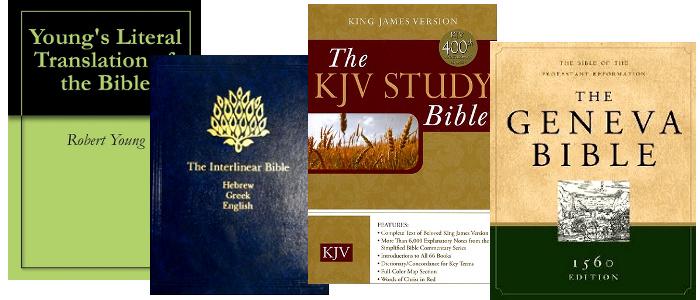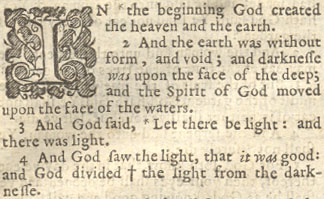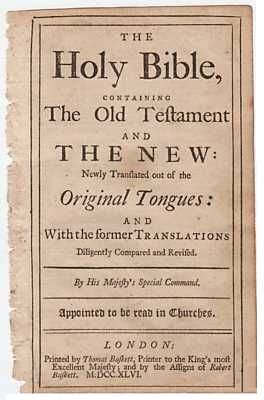Bible Versions Analyzed
Information about various Bible versions and translation problems.

Introduction
Find out why so many people still use the King James Version of the Holy Bible. There are many serious problems with a large number of modern bible versions. The articles listed below will help you learn some things about the Bible you use and your pastor uses. Don’t assume that modern translations are better or just consist of updated language. Many modern Bible translations are based on corrupt Greek manuscripts that vary in significant ways from the King James Bible. Some of the differences involve errors, changes and omissions that affect critical/essential Bible doctrines.
Books About Bible MANUSCRIPT Versions
Before looking at Bible translation versions, it can be helpful to look at the various Greek and Hebrew manuscripts that have been used by Bible translators.
- Facts About The Manuscripts
- The Codex Vaticanus a.k.a. Codex B Manuscript
- The Codex Sinaiticus Manuscript
- The Textus Receptus Manuscript
- A Chronological List of Major Greek New Testament Manuscripts
- A Table of NT Greek Manuscripts
- Does Older Necessarily Mean Better?
- Who Were Westcott And Hort?
Books About Bible Versions & Translations
- Dangerous Doctrinal Attacks In The Modern Bible Versions by Ken Matto (free PDF e-book)
- Who Faked the “World’s Oldest Bible”? (for purchase)
- The Modern Version Incursion (for purchase)
- 51 Reasons Why The King James (for purchase)
- Answers to Your Bible Version Questions (for purchase)
- Why They Changed the Bible (for purchase)
- Understandable History of the Bible (for purchase)
- If The Foundations Be Destroyed (for purchase)
- Let’s Weigh the Evidence (for purchase)
- Yes You Can Read the King James Bible (for purchase)
- Bible Version Secrets Exposed (for purchase)
- Look What’s Missing! (for purchase)
- Final Authority (for purchase)
- Did the Catholic Church Give Us the Bible? (for purchase)
- Defending The King James Bible, A Four-Fold Superiority – D.A. Waite (free PDF e-book)
- New Age Bible Versions by G.A. Riplinger (on-line scanned book pages)
- New Age Bible Versions by G.A. Riplinger (for purchase)
- New Age Bible Versions – 2020 edition (for purchase)
- Revision Revised by John William Burgon (book summary and reviews)
- The 357 Magnum Errors Of The Modernist’s Critical Texts by Edward Rice (free PDF e-book)
Videos About Bible Versions & Translations
- New Age Bible Versions – Gail Riplinger
- One Book Stands Alone – Doug Stauffer (1 hour version)
- One Book Stands Alone: The Attack on the Doctrine of Salvation (part 1 of 4)
- One Book Stands Alone: The attack on the Deity of Jesus Christ (part 2 of 4)
- One Book Stands Alone: The Roman Catholic Influence Behind the Modern Versions (part 3 of 4)
- One Book Stands Alone: The New King James PerVersion (part 4 of 4)
- Texe Marrs: Unholy Bible Versions Of The New Age
- Ridiculous Bible PerVersions Of The New Age
- From NIV to KJV Part 1
- The Word And The Light Of The King Jesus Version Part 1
- David Daniels Interview Part Two – Is Codex Vaticanus a Forgery?
“Sanctify them through thy truth: thy word is truth.” John 17:1
Recommended KJV Study Bibles:
- King James Version Study Bible – Reformation Heritage Books (Joel Beeke editor)
- Additional KJV Study Bibles
Our Own Bible Version Articles:
- A Brief History of the King James Bible
- An Amazing Fact About the King James Bible
- Any Bible Translation Will Do
- Bible Table – Catholic, Protestant & Jewish
- Bible Verses Removed
- Bible Version Information – Missing Words
- Bible Version Links
- Comprehensive List Of English Bible Versions
- Does The Authorized Version Contain Archaic Words?
- How We Got Our Bible
- Introductory Dedication To King James
- New Testament Canons Through The Ages – Part 1
- New Testament Canons Through The Ages – Part 2
- New Testament Canons Through The Ages – Part 3
- Practical Reasons for Retaining the KJV
- The Eye Opener – 200 Bible Verses Changed
- The KJV Translators’ Preface To The Reader
- Which Bible Verses Did The NIV Delete?
- Which Version Of The Bible Should You Use?

Articles Around The Web About The KJV And Problems With Modern Bible Translations:
- The James White Controversy – Part 1
- Which Bible Is Preserved Of God? by David Otis Fuller (PDF)
- C.I. Scofield – Can He Be Trusted? by Ken Matto (PDF)
- 4 Reasons For Defending The KJV by D.A. Waite (PDF)
- Defending The KJV by D.A. Waite, 2 page pamphlet (PDF)
- An Examination of the Modern King James Version
- The Doctrinal Significance of Deleted Portions of Holy Scripture
- The Thinking, Theories and Theology of Drs. Westcott and Hort
- The King James Version and The Professor (D.A. Carson)
- The King James Version Is Right!
- A Public Spanking For James White
- Modern Bible Deception Verse Comparison Study
- Dial-The-Truth-Ministries – Information defending/supporting the KJV Bible
- Does the Authorized Version contain archaic words?
- English Bible History – a timeline
- English Bible Versions – extensive listing at bible-researcher.com
- Fighting Back – A Handy Reference For King James Bible Believers
- Historical Timelines of Bible Translations & Biblical Texts
- Introductory Dedication To King James In the 1611 KJV Bible
- James White’s Bible Blunders Book – audio message at YouTube by Will Kinney
- Jame’s White’s Shell Game – article pointing about problems with James White’s analysis of the KJB
- KJV Today – Information about the accuracy, reliability and relevance of the King James Bible
- Modern Bible Versions – A Trojan Horse
- The History Of The English Bible at bibletopics.com
- Newadvent.org’s “Versions Of The Bible” page – Please note: New Advent is a Catholic organization
- The New Eye-Opener – 200 English Bible changes examined
- The Translators’ Preface To The Reader In the 1611 KJV Bible
- The English Standard Version Exposed By Ken Matto
- 448 Reasons Why I Cannot Trust Any Modern Bible Version! (PDF format)
- The Ever Changing ESVs: 2001, 2007, 2011 And 2016 Editions = Just Another Vatican Version
- Two New Testament Text Lines
- Lineage Of Modern Corrupt Versions Of The Bible by Ken Matto
- The Revised Standard Version Exposed
- How New is the New International Version?
- The New American Standard Version And The Deity of Christ (1963)
- Should Christians Trust The Revised Standard Version?
- The New English Bible

The King James Bible Compared To The Geneva Bible:
- The King James Version compared to the Geneva Bible
- KJV Vs Geneva Bible
- Geneva Bible vs. King James Bible – Which is Better? – Part 1
- Geneva Bible vs. King James Bible – Which is Better? – Part 2
- Bible Translation Effects: Geneva vs. King James
- KING JAMES BIBLE VERSUS GENEVA BIBLE
The King James Bible Compared To The MODERN King James Bible (MKJV):
- Modern King James Version For the Olive Tree Bible App
- What is the Modern King James Version (MKJV)?
Additional MKJV (Modern King James Version) Information:
- Online copy of the Modern King James Version at bibliatodo.com
- Online copy of the Modern King James Version at studybible.info
Young’s Literal Translation (YLT) Information:
- What is Young’s Literal Translation (YLT)?
- Online copy of Young’s Literal Translation at biblestudytools.com
- Online copy of Young’s Literal Translation at studylight.org
- Online copy of Young’s Literal Translation at biblehub.com
- Online search page for YLT and other versions at blueletterbible.org
- Young’s Literal Translation Of The Bible – Introductory Text (PDF format)
- Revised (modernized) Young’s Literal Translation New Testament
Bible-related Greek And Hebrew Manuscript Issues:
- Aren’t Older Manuscripts More Reliable?
- The Unreliability of the Alexandrian Manuscripts
- The Oldest and Best Manuscripts
- The Two Paths Of New Testament Manuscripts
Scripture Canon Issues:
(which books ended up in the Bible and which ones were left out and why)
- Where did the Bible come from? How did we get the Bible?
- What is the canon of Scripture?
- How and when was the canon of the Bible put together?
- The Canon of the Catholic Bible
- How do we decide which books belong in the Bible since the Bible does not say which books belong in the Bible?
- What was the process of deciding on the New Testament canon?
- The closed canon—what are the implications?
Kent Hovind on Bible Versions
King James Version Only?
I am not advocating the use of ONLY the King James Version of the Bible and I am not saying that the KJV is divinely inspired – which the original Hebrew and Greek manuscripts ARE, although I do believe the KJV is a very good, very accurate translation and worth standardizing upon, as had been the practice of a majority of English-speaking churches for centuries. I am definitely advocating the avoidance of Bible versions that use UNRELIABLE and most likely CORRUPT manuscripts as their source material, as concluded by TRUSTWORTHY bible scholars like John Gill and others. Here is what John Gill had to say about the “other” (untrusted) manuscripts and their omission of many bible verses, taken from Gill’s commentary on 1John 5:7 “For there are three that bear record in heaven”…
The genuineness of this text has been called in question by some, because it is wanting (missing) in the Syriac version, as it also is in the Arabic and Ethiopic versions; and because the old Latin interpreter has it not; and it is not to be found in many Greek manuscripts; nor cited by many of the ancient fathers, even by such who wrote against the Arians, when it might have been of great service to them: to all which it may be replied, that as to the Syriac version, which is the most ancient, and of the greatest consequence, it is but a version, and a defective one. The history of the adulterous woman in the eighth of John, the second epistle of Peter, the second and third epistles of John, the epistle of Jude, and the book of the Revelations, were formerly wanting in it, till restored from Bishop Usher’s copy by De Dieu and Dr. Pocock, and who also, from an eastern copy, has supplied this version with this text. As to the old Latin interpreter, it is certain it is to be seen in many Latin manuscripts of an early date, and stands in the Vulgate Latin edition of the London Polyglot Bible: and the Latin translation, which bears the name of Jerome, has it, and who, in an epistle of his to Eustochium, prefixed to his translation of these canonical epistles, complains of the omission of it by unfaithful interpreters. And as to its being wanting (missing) in some Greek manuscripts, as the Alexandrian, and others, it need only be said, that it is to be found in many others; it is in an old British copy, and in the Complutensian edition, the compilers of which made use of various copies; and out of sixteen ancient copies of Robert Stephens’s, nine of them had it: and as to its not being cited by some of the ancient fathers, this can be no sufficient proof of the spuriousness of it, since it might be in the original copy, though not in the copies used by them, through the carelessness or unfaithfulness of transcribers; or it might be in their copies, and yet not cited by them, they having Scriptures enough without it, to defend the doctrine of the Trinity, and the divinity of Christ: and yet, after all, certain it is, that it is cited by many of them; by Fulgentius, in the beginning of the “sixth” century, against the Arians, without any scruple or hesitation; and Jerom, as before observed, has it in his translation made in the latter end of the “fourth” century; and it is cited by Athanasius about the year 350; and before him by Cyprian, in the middle, of the “third” century, about the year 250; and is referred to by Tertullian about, the year 200; and which was within a “hundred” years, or little more, of the writing of the epistle; which may be enough to satisfy anyone of the genuineness of this passage; and besides, there never was any dispute about it till Erasmus left it out in the first edition of his translation of the New Testament; and yet he himself, upon the credit of the old British copy before mentioned, put it into another edition of his translation.” – John Gill
LOOK What’s Missing in Your Bible by David Daniels
Does The Issue Of Bible Versions Really Matter?
1. Are we not to care about what may be added, changed or removed from our bibles unless and until it gets to the point where a major doctrine is affected? Won’t it be too late then? Isn’t this all part of contending for the faith and proving all things? Should a doctor wait until cancer spreads to at least 3 organs before he treats a patient for it?
2. Isn’t truth worth digging for and fighting for, especially in view of what Jesus said to Pilate about truth in John 18:37 (I have come to testify to the truth), especially when we are dealing with the truth of God’s word? Bear in mind that Jesus could have said a lot of things to his executioner just before his execution but he chose to say that he came to testify to the truth. This fact along with the fact that Satan was all too anxious to have Adam and Eve question God’s word, should be a reminder to all Christians that there are forces constantly at work, going about undermining and corrupting God’s word and I don’t think the correct response is to ignore the attacks for the sake of unity, but to base unity upon truth, a truth that is worth seeking with all your heart (Jeremiah 29:13).
3. If the Received Text (majority text) has been viewed as more trustworthy by the Church for so many centuries, and if readability is a concern, why not use newer versions than the KJV that use the more reliable manuscripts, like Young’s Literal Translation (YLT)? This may be a matter of there being a lot more commentaries and concordances for the KJV than for the MKJV, YLT or other newer translations.
4. Should we use the modern versions (NASB, ESV, NIV, etc.) because they happen to be so popular with well known Bible teachers and preachers who use them and/or recommend them? Perhaps those well known preachers “bought” into a lot of false information and propaganda about bible versions from whatever Bible college or seminary they attended, institutions that were, in many cases, infiltrated by liberal scholars and false teachers a long time ago. How many contemporary Bible schools have men like John Gill on their staff these days?
5. Perhaps modern versions are less about “readability” and “accuracy” and more about copyrights and making money. Similarly, we should ask ourselves if modern bible schools are more about making money and cranking out more hirelings for the unbiblical “clergy-laity” system, who then go on to tell the “sheeple” to just listen to their “masters” (see Matthew 23:8-10), instead of telling them to be like the Bereans of Acts 17:11 who didn’t even trust the words of the apostle Paul until they had confirmed that his teachings were in line with Scripture.



















